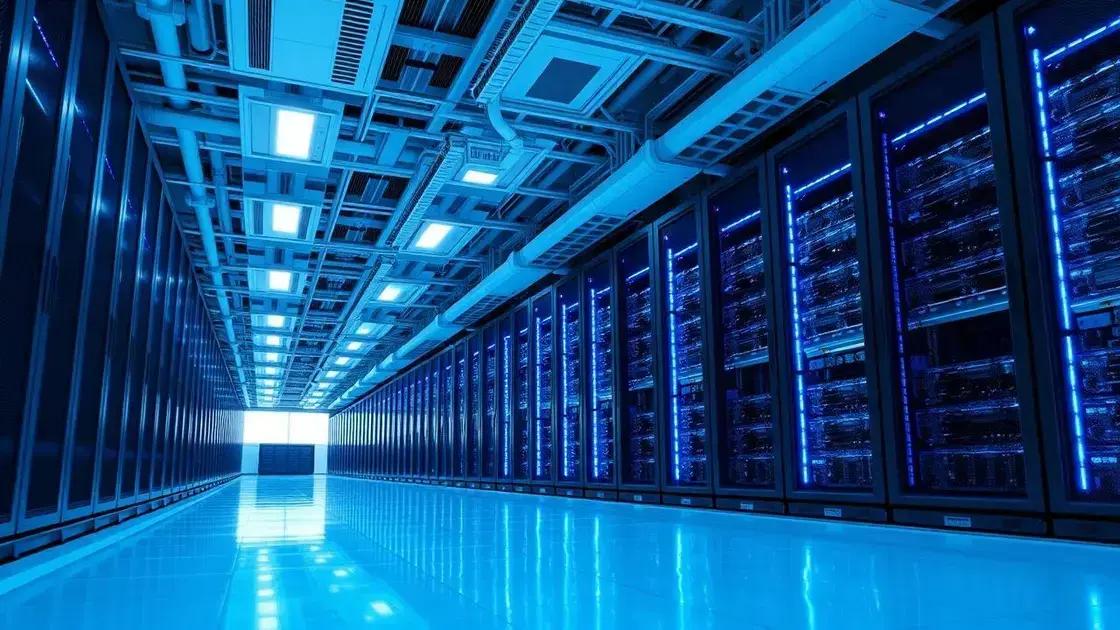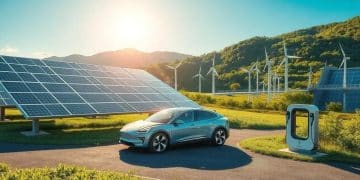Latest on data center efficiency news: What you need to know

Latest trends in data center efficiency focus on integrating AI and renewable energy, adopting modular designs, and implementing advanced cooling technologies to enhance performance and reduce environmental impact.
Latest on data center efficiency news offers exciting insights into how companies are evolving their operations. What changes are leading to greater sustainability and cost savings in this vital sector? Let’s dive in!
Understanding data center efficiency
Understanding data center efficiency is crucial for optimizing energy consumption and enhancing overall performance. Data centers house servers that store and manage data, and their efficiency directly impacts both operational costs and environmental sustainability.
Many factors influence a data center’s efficiency. Cooling systems play a vital role. They ensure servers remain at optimal temperatures, but they also consume a lot of energy. Adopting advanced cooling technologies can substantially reduce energy use.
Key factors affecting efficiency
Several elements can enhance a data center’s performance:
- Utilization of virtualization to maximize server capacity.
- Implementation of energy-efficient hardware.
- Use of renewable energy sources to power operations.
- Regular maintenance of equipment to prevent outages and inefficiencies.
Additionally, intelligent load management helps balance the energy used by different servers, leading to reduced peak loads. Incorporating advanced monitoring tools can facilitate real-time adjustments, enhancing responsiveness to energy demands.
The significance of cooling solutions
Cooling solutions are often the most significant consumers of power in data centers. Transitioning to liquid cooling or using outside air can efficiently manage temperatures while lowering energy bills. Many companies are now investing in free cooling methods, drawing on natural climate conditions to reduce reliance on traditional cooling systems.
Moreover, an effective cooling strategy can extend the lifespan of equipment, thereby saving costs long term. As the demand for data center capabilities grows, prioritizing efficiency will become essential for maintaining a competitive edge.
By understanding these concepts thoroughly, businesses can create strategies that not only improve efficiency but also align with sustainability goals. The smarter the approach, the greater the benefits for both the environment and the bottom line.
Current trends in energy optimization

Current trends in energy optimization focus on innovative methods that help reduce energy consumption in data centers. As technology evolves, companies are seeking new ways to enhance efficiency and minimize costs.
One major trend is the integration of artificial intelligence (AI) to monitor and manage energy use in real time. AI systems can predict energy needs based on historical data, allowing data centers to adjust their operations dynamically. This not only saves energy but also helps in planning maintenance schedules more effectively.
Emerging technologies
Several emerging technologies are paving the way for better energy optimization:
- Machine learning algorithms that optimize cooling systems.
- Smart grid technology for improved energy distribution.
- Advanced battery storage solutions that store energy more efficiently.
- Utilization of geothermal energy systems to reduce reliance on conventional energy sources.
Another trend is the focus on adapting existing infrastructure to be more energy-efficient. Many data centers are retrofitting their systems with energy-saving devices and sensors, which can help track usage patterns and identify areas for improvement.
Renewable energy integration
Integrating renewable energy sources like solar and wind is becoming increasingly popular. Companies aim to reduce their carbon footprint by utilizing green energy solutions. Many organizations now have power purchase agreements (PPAs) with renewable energy suppliers, ensuring a steady and sustainable energy supply.
Furthermore, continual advancements in cooling technologies are also transforming how energy is used. Solutions such as liquid cooling and evaporative cooling can drastically cut down energy consumption compared to traditional air-conditioning methods. As these technologies advance, they are quickly becoming standard in new data center builds.
By closely following these trends, businesses not only contribute to a more sustainable future but also achieve significant savings on energy costs. Staying updated on these developments is crucial for any organization wanting to remain competitive and responsible.
Technology driving data center sustainability
Technology driving data center sustainability plays a crucial role in reducing environmental impacts. As the demand for data storage grows, it is essential to adopt solutions that promote both efficiency and sustainability.
One significant technology in this space is energy-efficient design. Modern data centers are being built with green building practices that focus on maximizing energy usage. Components like high-efficiency power supplies and smart cooling systems enable better energy management.
Renewable energy sources
Integrating renewable energy is another important trend. Many data centers are starting to rely on solar, wind, or hydroelectric power. This shift not only reduces the carbon footprint but also stabilizes energy costs over time, making operational expenses more predictable.
- Utilization of solar panels for on-site energy generation.
- Partnerships with renewable energy providers for green energy purchasing agreements.
- Investing in energy storage solutions to manage supply and demand.
Furthermore, advancements in server virtualization allow multiple workloads to run on a single physical server, thereby reducing the total number of machines needed. This greatly decreases energy consumption and hardware waste associated with traditional setups.
Innovative cooling techniques
Innovative cooling techniques also contribute to sustainability. Liquid cooling solutions are gaining popularity because they require less energy than air cooling and are more effective at dissipating heat. In addition, companies are experimenting with outside air cooling strategies to further optimize energy use based on ambient temperature.
As technology advances, improvements in energy monitoring systems provide real-time data on energy use and efficiency. These insights allow data centers to implement necessary changes promptly, ensuring maximum efficiency.
In summary, technologies like energy-efficient designs, renewable energy integration, server virtualization, and innovative cooling solutions are key players in driving sustainability in data centers. Staying updated on these technologies is vital for organizations aiming to enhance their environmental responsibility while maintaining performance.
Future outlook of data center efficiency

Future outlook of data center efficiency indicates that ongoing advancements will continue to reshape how data centers operate. The push for greater sustainability and efficiency remains strong as technology evolves.
One key aspect driving future improvements is the adoption of next-generation hardware. Hardware that is designed to consume less power while delivering better performance is essential for optimizing energy use. Innovations in server design allow for greater compute density, effectively reducing the number of units needed.
Integration of AI and machine learning
Another area to watch is the increasing integration of artificial intelligence (AI) and machine learning in managing operations. These technologies can analyze vast data sets to identify inefficiencies and suggest real-time adjustments. This ensures that energy consumption aligns closely with current workload needs.
- Predictive maintenance to lower downtime.
- Automated adjustments to cooling and power usage based on real-time data.
- Enhanced capacity planning to optimize resource distribution.
Moreover, the future will likely see data centers turning more towards modular designs. Modular data centers are scalable and allow for easy upgrades without overhauling entire systems. This can lead to better resource management and efficiency.
Focus on sustainability
The commitment to sustainability will drive the next wave of innovations. Companies are expected to expand their use of renewable energy sources. Such steps not only cut costs but also help organizations meet regulatory requirements and enhance their corporate responsibility profiles.
Energy storage solutions will also play a more significant role. By effectively managing energy availability and demand, data centers can improve their efficiency and ensure better reliability, even during peak usage times.
In summary, the future of data center efficiency appears promising with trends like AI integration, modular designs, and sustainability commitment at the forefront. Keeping pace with these changes is vital for maintaining a competitive edge in the ever-evolving tech landscape.
FAQ – Frequently Asked Questions about Data Center Efficiency
What are the main factors influencing data center efficiency?
Key factors include energy-efficient designs, cooling systems, server utilization, and the adoption of renewable energy sources.
How can artificial intelligence improve data center operations?
AI can analyze data in real-time to optimize energy use, predict maintenance needs, and improve overall operational efficiency.
What role does renewable energy play in data center sustainability?
Renewable energy sources like solar and wind reduce the carbon footprint and help stabilize energy costs for data centers.
What are modular data centers and why are they important?
Modular data centers are scalable and allow for easy upgrades, promoting better resource management and energy efficiency.





